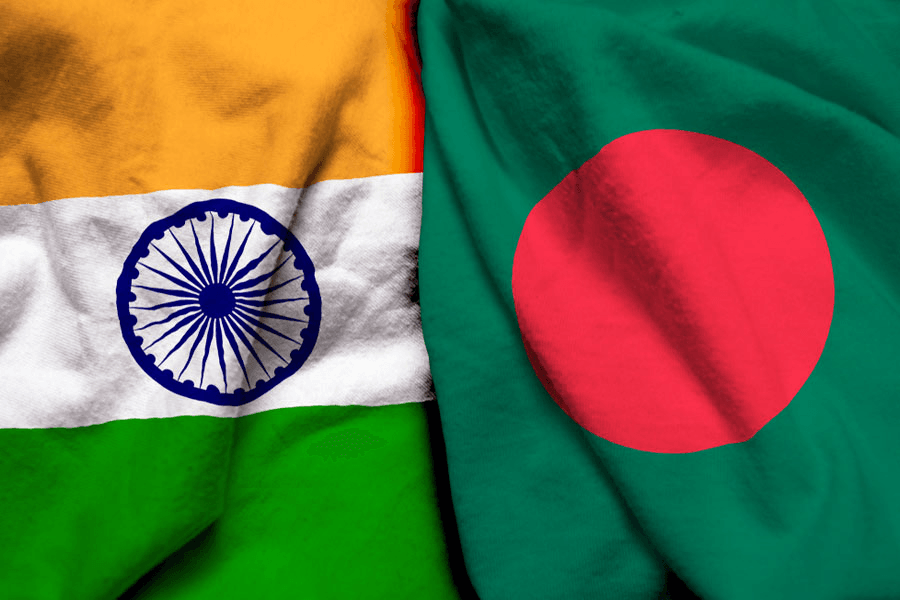Current Affairs 2024- Understanding India-Bangladesh Relations: Evolution, Cooperation, and Challenges
Nishi
Feb, 2025
•4 min read
India and Bangladesh share a complex and multidimensional relationship shaped by historical events, cultural ties, and geopolitical considerations. Understanding the evolution, significance, and challenges in Indo-Bangladesh relations is crucial for UPSC aspirants. This blog delves into the key aspects of the bilateral relationship, offering insights into cooperation, challenges, and future opportunities.

The Significance of Bangladesh for India
- Geopolitical Importance: Bangladesh is a strategic neighbor with whom India shares a long land and maritime border. The geopolitical significance of Bangladesh lies in its strategic location, acting as a buffer against China’s influence in the region. India’s security policy heavily relies on Bangladesh's cooperation, especially in countering Chinese advances, such as the "String of Pearls" strategy.
- Economic Ties: Bangladesh is one of India’s largest trading partners in South Asia. Bilateral trade in 2021-2022 reached USD 18.2 billion. India exports essential goods to Bangladesh, including machinery, chemicals, and textiles. Furthermore, India plays a crucial role in Bangladesh’s infrastructure development through Lines of Credit (LOCs) and aid programs.
- Cultural and People-to-People Connect: The cultural bond between India and Bangladesh is evident in shared history, language, and religious traditions. The common cultural heritage of both nations strengthens their people-to-people ties, with millions of families having connections across the border. The Indira Gandhi Cultural Centre (IGCC) in Dhaka fosters this relationship through cultural exchanges and educational programs.
Areas of Cooperation Between India and Bangladesh
- Economic and Commercial Partnerships: India is Bangladesh’s largest trade partner in South Asia, and the growing economic relations reflect this. With bilateral trade crossing USD 18 billion, both countries aim to expand trade in areas like energy, infrastructure, and services.
- Connectivity Enhancements: A significant area of cooperation is improving connectivity through transportation and communication. The restoration of railway links such as the Chilahati-Haldibari route and the Agartala-Akhaura rail link is enhancing the movement of goods and people. The Protocol on Inland Water Transit and Trade (PIWTT) facilitates seamless transportation across rivers.
- Energy and Infrastructure Cooperation: India has been instrumental in supporting Bangladesh’s energy needs. The construction of the Rooppur Nuclear Power Plant, with assistance from India and Russia, is a key example of this collaboration. Additionally, energy pipelines like the India-Bangladesh Friendship Pipeline are helping to meet Bangladesh's growing energy demands.
- Defense and Security Cooperation: India and Bangladesh share a strategic military relationship. High-level military exchanges and joint exercises, such as Bangosagar, highlight their cooperation in countering regional threats. Additionally, joint efforts in combating terrorism and insurgency along the border have strengthened security ties.
Key Challenges in India-Bangladesh Relations
Despite the positive trajectory of bilateral relations, several challenges persist:
- Geopolitical Tensions: Tensions over border disputes, such as the Comilla-Tripura land border issue, have caused friction. Additionally, the flow of illegal immigration from Bangladesh to India continues to strain bilateral ties, particularly in northeastern states like Assam and Tripura.
- Water Sharing Disputes: The Teesta River remains a contentious issue, with Bangladesh demanding more water for irrigation. The Farakka Barrage and the distribution of Ganges water have been sources of dispute for decades, affecting relations and requiring timely resolution.
- Security Concerns: Cross-border terrorism remains a persistent issue, with Indian authorities accusing Bangladeshi-based insurgents of operating from within Bangladesh. India has urged greater cooperation in countering terrorism and insurgency activities along the shared border.
- Influence of China: China’s growing influence in Bangladesh, through investments in infrastructure and the Belt and Road Initiative (BRI), poses a challenge to India. The increasing Chinese footprint in ports and energy sectors in Bangladesh has implications for regional security and India’s strategic interests.
Steps to Enhance India-Bangladesh Relations
- Resolving the Teesta River Dispute: The Teesta River water-sharing issue requires urgent resolution to ensure equitable distribution. A comprehensive agreement should be reached to address Bangladesh's water needs while preserving India's interests in the region.
- Boosting Regional Connectivity: Further enhancing connectivity through rail, road, and waterways will promote trade, tourism, and cultural exchanges. Strengthening the Bangladesh-India rail network and establishing new transit routes could significantly boost economic ties.
- Focus on Comprehensive Economic Partnership: Negotiating a Comprehensive Economic Partnership Agreement (CEPA) will deepen economic cooperation, streamline trade processes, and remove barriers to smoother bilateral transactions.
- Countering China’s Influence: India should work towards assisting Bangladesh in key technological sectors, such as artificial intelligence and nuclear technology, to ensure that Bangladesh does not become overly reliant on China for its development.
- Collaborating on Multilateral Platforms: India and Bangladesh can strengthen their cooperation in regional and multilateral forums like SAARC, BIMSTEC, and ASEAN to foster greater integration in South and Southeast Asia.
Conclusion: A Promising Future for India-Bangladesh Relations
India and Bangladesh share a deep-rooted relationship that has evolved. While challenges remain, particularly in areas like water-sharing, border disputes, and security concerns, the potential for growth and cooperation is immense. Both countries must work together to resolve disputes and harness their collective potential for regional stability and prosperity. For UPSC aspirants, understanding these dynamics is crucial for both the Geography and International Relations segments of the exam.
By focusing on key areas of cooperation and addressing the challenges, India and Bangladesh can continue to build a stronger, more harmonious relationship in the years to come.


